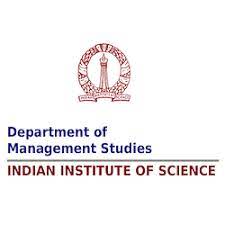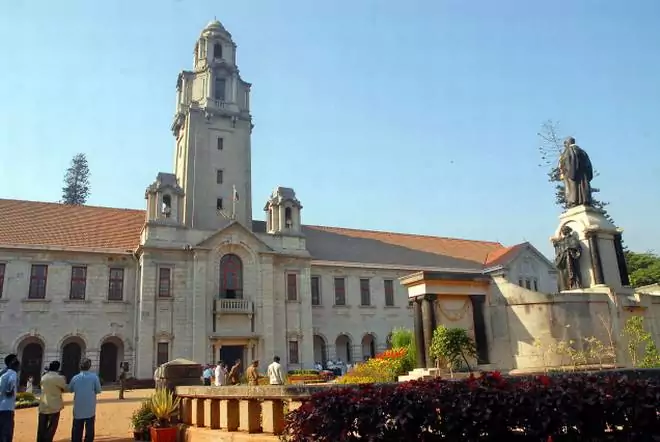- Overview
- Courses & Fees
- Admissions
- Placements
- Infrastructure
The Data, Machines, and Systems Initiative (DMSI) at the Indian Foundation of Science (IISc) Bangalore is a spearheading interdisciplinary exploration community pointed toward propelling the fields of information science, AI, and framework designing. Established with a dream to incorporate hypothetical and applied parts of these spaces, DMSI unites specialists from software engineering, electrical designing, and different disciplines to encourage inventive examination and schooling.
DMSI uses areas of strength for IISc in logical exploration to handle mind boggling, true issues through information driven approaches. The middle spotlights on state-of-the-art regions, for example, computerized reasoning, large information examination, and digital actual frameworks, trying to push the limits of current mechanical abilities. Its examination projects frequently address basic difficulties in medical services, metropolitan preparation, and environment science, accentuating useful applications and cultural effect.
Notwithstanding its examination drives, DMSI plays a huge part in teaching the up-and-coming age of researchers and specialists. It offers specific courses, studios, and classes to outfit understudies with the abilities expected to succeed in the quickly advancing scene of information and machine knowledge. Coordinated efforts with industry and other scholastic organizations further upgrade the middle's effect, making DMSI a center point for development and greatness in information science and framework designing.
| Course | Fees | Eligibility |
| Master's in management studies [MMS] | ₹2,66,500 | Graduation |
| Master of Management Studies [MMS] (Business Analytics) | ₹2,66,500 | Graduation |
| Ph.D. (Management Studies) | ₹35,200 | Post Graduation |
The admission procedures to the Data, Machines, and Systems Initiative (DMSI) in the Indian Institute of Science (IISc) Bangalore involve a general admission policy for postgraduate and doctoral degrees programs in the institute. Here is an overview of the process: Here is an overview of the process:
For M. Tech. and M. Tech. (Research) Programs:
Eligibility:
Education requirement for the post of Manager includes that the candidates should possess a bachelor's degree in engineering technology or a master's degree in science or an equivalent qualification.
A valid GATE score is often an essential step for admission into these colleges and universities.
Application:
Students seek an online portal for admission at IISc where they apply for the programs of their choice.
The applicants must provide such details as name, contact information, address, academic achievements, GATE score.
Selection Process:
In admission, short listing is conducted according to the scores that candidates obtain from GATE.
Candidates on the short-list may undergo further tests and/or interviews in the form of a written test.
For Ph. D. Programs:
Eligibility:
Engineering/Technology or a master's degree in science with good academic record is also an essential requirement.
Other qualifications include those persons with a bachelor's degree in engineering /technology of any University recognized by the University of Botswana and must also have a good academic record.
Mailing lists typically specify that a valid GATE/NET (for science disciplines) score is sometimes obligatory.
Application:
It is to mention that IISc applications are filled via the online application form available for the IISc admissions.
Files must include academic credentials, research experience and/or projects, TOEFL/IELTS scores, and other standardized tests.
Selection Process:
Interviews are conducted based on the candidate’s academic performance, his/ her GATE/ NET scores and experience, if any.
Applicants shortlisted for the position undergo a written test followed by an interview or just an interview alone.
General Admission Timeline:
Notification and Application: Usually begins in February or March, but it depends on the specific strategy or system under implementation.
Deadline for Applications: Travellers typically visit during this time most often in March/April.
Interviews/Tests: Conducted in May/June.
Final Admission: Examination results are released within June/July while the academic session begins in August.
Additional Information:
Scholarships: There are several practices to provide scholarships or other forms of financial support to the candidates if they meet the requirements.
International Students: International students also have a different category of admission; this means that they must meet different requirements and different admission procedures.
Pre-Placement Talks (PPTs):
Companies visit the campus to deliver pre-placement talks, providing insights into their organization, job roles, career growth opportunities, and selection procedures.
Registration:
Interested students register for the placement process with the institute’s placement cell. They may be required to submit their resumes and other necessary documents.
Application:
Students apply to companies they are interested in. Each company may have specific requirements regarding eligibility and the application process.
Selection Process:
Aptitude Tests: Initial screening through written tests assessing analytical, logical, and technical skills.
Group Discussions: Some companies conduct group discussions to evaluate communication, teamwork, and problem-solving abilities.
Technical Interviews: Focus on domain-specific knowledge and problem-solving skills.
HR Interviews: Assess candidates' personality, strengths, weaknesses, and fit for the organization.
Offers and Acceptance:
Companies extend job offers to selected candidates. Students review offers and formally accept them through the placement cell.
List of Companies
- Technology and Engineering:
- Microsoft
- Intel
- IBM
- Oracle
- Cisco
- Samsung
- Texas Instruments
- Finance and Consulting:
- Goldman Sachs
- Morgan Stanley
- McKinsey & Company
- Boston Consulting Group (BCG)
- Deloitte
- PwC
- Research and Development:
- DRDO (Defence Research and Development Organisation)
- ISRO (Indian Space Research Organisation)
- IBM Research
- Bell Labs
- General Electric (GE)
- Automobile and Manufacturing:
- Bosch
- Tata Motors
- Mahindra & Mahindra
- Siemens
IISc Bangalore boasts state-of-the-art infrastructure to support both academic and extracurricular activities:
1. Academic Facilities:
Advanced Laboratories: Equipped with cutting-edge technology for research in various fields.
Libraries: Extensive collections of books, journals, and digital resources.
Classrooms: Modern, air-conditioned classrooms with audio-visual aids.
2. Residential Facilities:
Hostels: Separate accommodations for men and women with facilities like Wi-Fi, recreational rooms, and mess services.
Guest Houses: For visiting faculty and guest lecturers.
3. Sports and Recreation:
Sports Complex: Facilities for sports like cricket, tennis, basketball, badminton, and athletics.
Gymnasium: Well-equipped gym for students and staff.
Swimming Pool: For leisure and competitive swimming.
4. Other Amenities:
Healthcare: On-campus medical facilities with qualified doctors and emergency care.
Cafeteria and Dining: Multiple dining options offering a variety of cuisines.
Wi-Fi and IT Infrastructure: Campus-wide Wi-Fi connectivity and dedicated computer centers.
IISC Bangalore’s robust placement process, combined with its comprehensive infrastructure, ensures students are well-prepared and supported as they transition from academia to industry.
.png)

